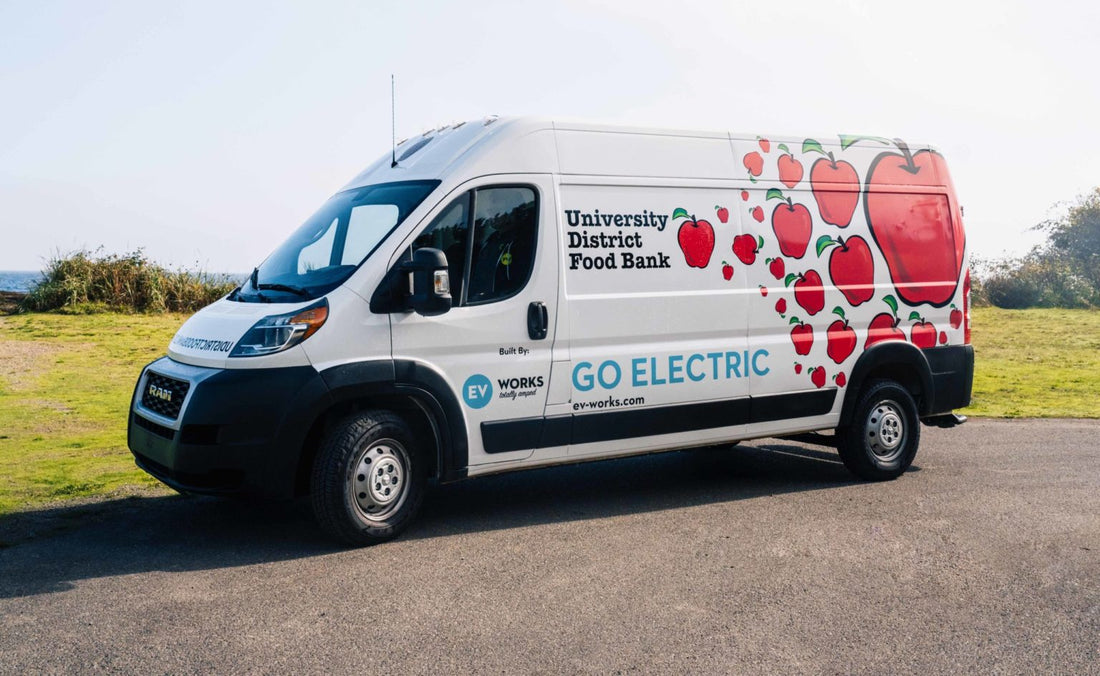A beloved neighborhood food bank turns to electric vehicle upstart EV Works for sustainable food rescue solution
More and more businesses and households across the Puget Sound region are feeling the financial impacts of the pandemic, and food bank visits are on the rise. “In 2019 we had 68,000 customer visits and distributed 3.1 million pounds of food,” says University District Food Bank Executive Director Joe Gruber. “By September 2020, we’d already surpassed those numbers.”
A wide variety of people rely on the food bank. “Approximately 19% of UDFB’s customers are infants and children, 63% are adults, and 18% are senior citizens,” says Gruber. “Another 17% are homeless, and we try to provide them with ready-to-eat foods when they visit. We also have two off-site food pantries, at Mercy Magnuson Place and North Seattle College, that provide another 380 households with food. There are a lot of facets and moving parts to our operation.”
A complex system where timing is everything
With so many people depending on the food bank’s services, planning and coordination matter, and reliable equipment is critical.
“We rescue surplus food from partnering area grocery stores, farms, and restaurants dozens of times each week,” says Gruber. “We need to get that food on our shelves and available to customers as quickly and efficiently as possible, so it’s essential that we have reliable transport mechanisms in place. We need refrigerated vehicles we can count on—because a lot of people are counting on us.”
Shifting to all-electric transport
With maintenance and repair costs steadily rising on their 12-year-old food rescue Sprinter van, UDFB staff went looking for a reliable, economical, environmentally friendly replacement.
“We are extremely budget-conscious when it comes to equipment and facilities,” says Gruber “and we’re always on the lookout for sustainable solutions. We were thrilled to find EV Works. Here’s this local company that’s fighting its way through COVID and adapting its business model to come up with creative, innovative, environmentally friendly solutions to help communities in need. The more we learned about their operation and business approach, the more impressed we became.”


Taking “reuse” and “recycle” to a new level
“We have access to a solution we felt would be perfect for UDFB’s needs,” says Greg Dronkert, EV Works Operations Manager. “The Maxwell Vehicles’ ePro vans use a RAM ProMaster platform and Tesla powertrain. This makes for a fully electric, environmentally friendly van with a 175-mile range and DC fast charging capability.”
Even the refrigeration is eco-friendly
“The ePro leaves a minute carbon footprint,” Dronkert says, “making it the most eco-friendly commercial van on the road. Customers can save up to $10,000 per year in fuel and maintenance costs, and “fueling” costs as little as 3.3¢ per mile.”
Eco credentials aside, the ePro is a workhorse with plenty of delivery capability. “The ePro has best-in-class interior cargo space and a 4,100-pound payload,” adds Dronkert.
“Also, the innovative approach Maxwell Vehicles uses to cool the cargo box is an absolute first in an electric delivery van. In simplest terms, the ePro refrigeration systems uses many of the same components typically used to cool the main battery pack. The result is a super-efficient, truly elegant solution.”
Test driving via Facetime
UDFB leaders communicated with the EV Works team via phone and email and took an ePro for a socially distant Facetime spin before committing to a van of their own. “It wasn’t an ideal way to check out a vehicle,” UDFB’s Gruber explains, “but we liked what we saw and were eager to check out the van in person.”
An in-person test drive was arranged, Gruber and his team were sold, and the food bank took delivery of their very own ePro in early October. The fully electric van has been hard at work on the job ever since.
“EV Works’ Maxwell ePro solution is perfect for our cold chain,” Gruber says. “Perishable items need to be protected from the time we pick them up from the donor to our door, and the ePro is allowing us to do that reliably, day after day, week after week. We’re thrilled with the performance and ultra-low carbon footprint of our new van.”

The road ahead
Prior to the COVID-19 pandemic, the Feeding America network of food banks served over 40 million people each year. Since the crisis began, food banks have faced a “perfect storm” that includes surges in demand, declines in food donations due to supply chain challenges, fewer available volunteers, and other disruptions to the charitable food assistance system’s operating model. [Source: Feedingamerica.org]
As stated on the feedingamerica.org website, “Because of COVID, more people than ever before are visiting food banks and many of them are getting help for the first time. Our neighbors who previously had stable incomes have now lost jobs or had their hours cut back. And food banks are stepping up, as they always have, to put food on the table for those who need it during this uncertain time.”
These needs exist in the Puget Sound, and University District Food Bank—with help from partners like EV Works—is embracing the challenge.
University District Food Bank facts
In July 2016, after more than 33 years at University Christian Church, UDFB moved into a purpose-built new home at 5017 Roosevelt Way NE, co-located with 49 units of affordable housing and a rooftop garden used to grow produce for the food bank. UDFB is now fundraising for an anaerobic bio digestor that will compost food, produce organic fertilizer, and help generate electricity to power the new ePro van.
University District Food Bank operates a walk-in food bank four days a week for individuals and families from across Northeast Seattle. UDFB offers food, toiletries, baby formula, diapers, pet food, and connections to important community resources to residents of zip codes 98102, 98103, 98105, 98112, 98115, and 98125.
